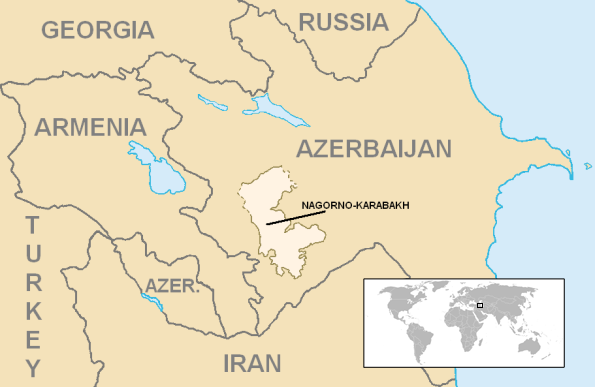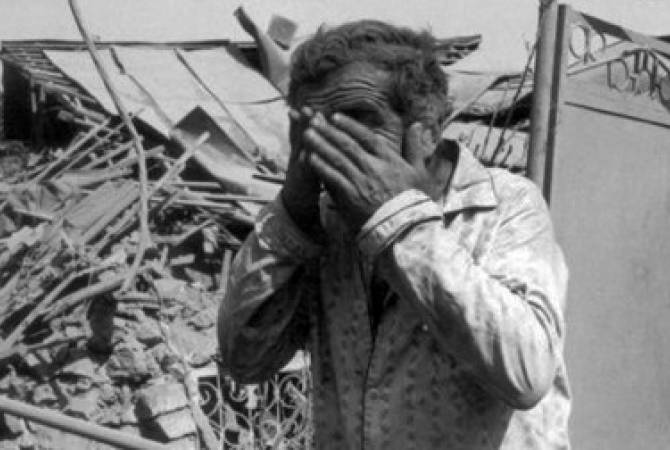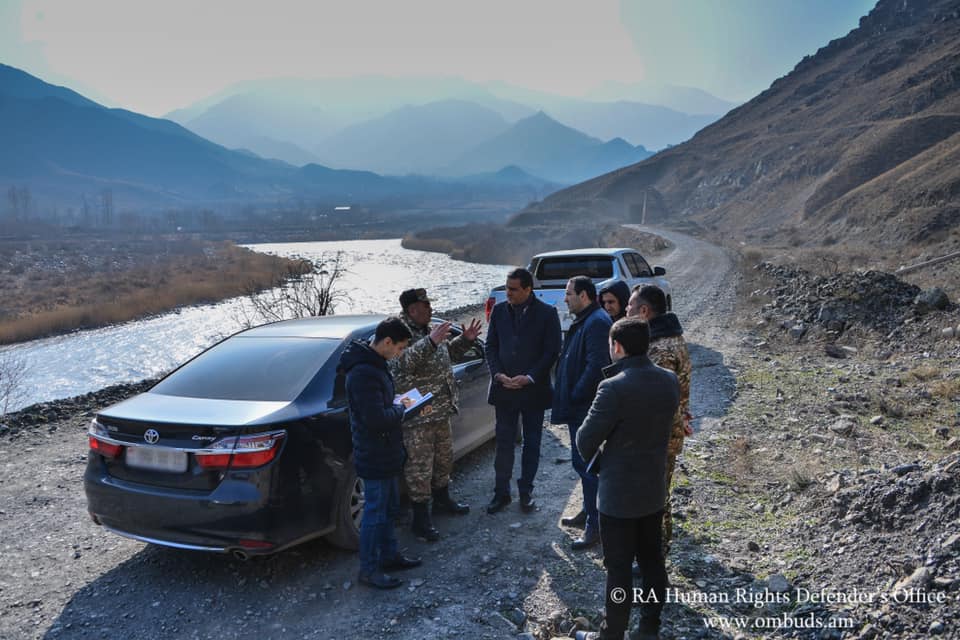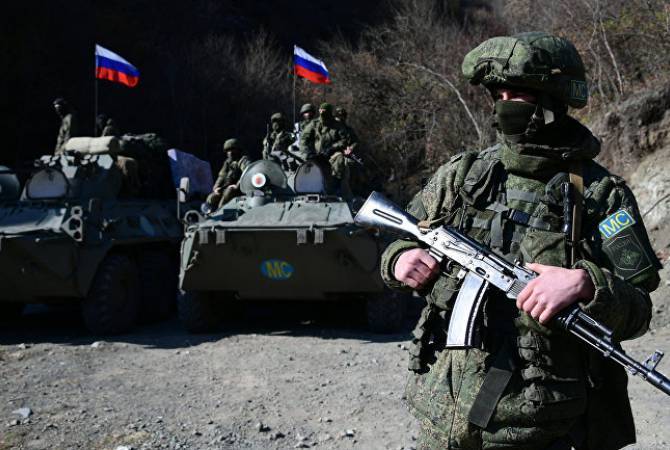The City of West Hollywood Unanimously Adopts a ResolutionRecognizing the Independent Republic of Artsakh
By Editorial Staff
 On January 19, 2021, the City of West Hollywood unanimously adopted a resolution recognizing the Independent Republic of Artsakh (Nagorno-Karabakh). View the resolution here.
On January 19, 2021, the City of West Hollywood unanimously adopted a resolution recognizing the Independent Republic of Artsakh (Nagorno-Karabakh). View the resolution here.
With the request and assistance of Armenian-American journalist, radio host, and activist, Vic Gerami, the resolution was sponsored by Councilmember Sepi Shyne and co-sponsored by Mayor Lindsey P. Horvath.
Last year, on October 19, 2020, the West Hollywood City Council unanimously adopted a resolution (NO. 20-5338) condemning Azerbaijan’s military operation in Nagorno-Karabakh and in support of a peaceful resolution to the conflict.
“As a gay Armenian-American, this is one of the most important and meaningful moments of my life. I can take a minute and exhale after witnessing Azerbaijan and Turkey’s genocidal assault and ethnic cleansing against Armenians of Artsakh since September 27, 2020,” said Vic Gerami, the host of THE BLUNT POST with VIC on KPFK 90.7 FM.
He continued, “West Hollywood is a trailblazer, so I hope that other cities and towns across the country will follow and stand in solidarity with Artsakh Armenians and their right for self-determination. I am grateful for Councilmember Shyne and Mayor Horvath and the three other Councilmembers for passing this monumentally important resolution unanimously.”
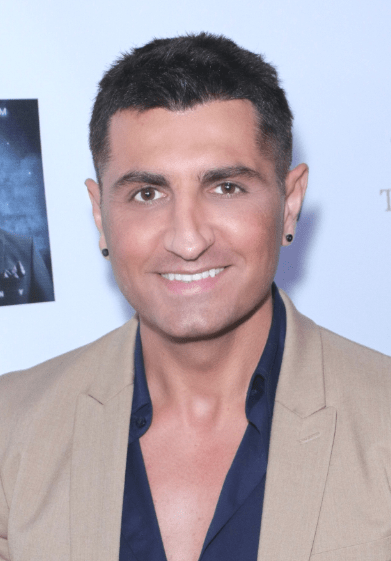
Vic Gerami
A spirit of community activism and civic pride thrives in West Hollywood for many of its approximately 35,000 residents. For more than three decades, West Hollywood has been one of the most influential small cities in the nation; no other city of its size has had a greater impact on the national progressive public policy agenda.
West Hollywood has set new standards for other municipalities, not only as a leader in many critical social movements — including HIV and AIDS advocacy; affordable and inclusionary housing; LGBT rights, civil rights, and human rights; women’s rights; protection of our environment; and animal rights — but also in fiscal responsibility.
“I want to thank Mayor Horvath for co-sponsoring this very important Resolution with me and proud of my colleagues for voting in support! The City of West Hollywood has historically stood for justice and we did it once again this evening by recognizing the Independence of the Republic of Artsakh. As an Iranian American, I am proud to stand with and be an ally to the Armenian community,” said West Hollywood Councilmember Sepi Shyne.
Approximately 900,000 Armenians live in CA, 700,000 of whom in the greater Los Angeles area, including West Hollywood, Hollywood, East Hollywood (Little Armenia), Glendale, Burbank, Pasadena, and throughout the San Fernando Valley.
West Hollywood Mayor Lindsey Horvath expressed her enthusiasm by saying, “This issue has been very important to me personally and to our City for quite some time. I have previously participated in marches to commemorate the Armenian genocide. In my first term as Mayor, I introduced an item directing our City to lower all flags in recognition of Armenian Genocide Day on its 100th anniversary – a tradition we now continue every year. Last year, the West Hollywood City Council unanimously adopted a resolution condemning Azerbaijan’s military operation in Artsakh and supporting a peaceful resolution to the conflict.”

Councilmember Sepi Shyne
She continued, “This year, we are building on the City’s legacy of respect and support for all people, with special acknowledgment of the unique atrocities that Armenian people have faced, by calling for formal recognition of the independence of the Republic of Artsakh. It is my deepest desire that our Council’s action gives further strength and support to bringing peace and stability to the region. We must demonstrate our commitment to standing with people of Armenian descent in our greater Los Angeles region who continue the fight for freedom. I remain an ally in this struggle and am glad to lead our City in this important act of solidarity.”
Ten (10) states across the US have recognized the Independent Republic of Artsakh so far. They are CA, CO, GA, HI, LA, MA, ME, MI, MN, RI. Cities that have recognized Artsakh include Los Angeles, Glendale, Fresno County, Highland, Gardena, Fort Lee Borough, Fowler, Englewood Cliffs, Clark County, Ridgefield, Cliffside Park, and Orange County.
In addition to dozens of cities across the US, hundreds of cities and principalities in France and Italy have recognized Artsakh, as well as cities in the United Kingdom, Spain, Uruguay, and Guatemala.
On November 25, 20202, the French Senate voted 305-1 recognizing the independence of the Republic of Artsakh, calling upon the US administration and Congressional leaders to take similar action.
Following the Senate’s vote, on December 3, 2020, France’s National Assembly approved a resolution calling on the government to recognize Artsakh as a “republic.” The resolution was adopted in the Assembly with 188 “yes” votes against three “no” votes, while 16 deputies abstained from voting.

West Hollywood Mayor Lindsey P. Horvath
About West Hollywood
The City of West Hollywood is like no other city in the world. In 1984, the idea for the City of West Hollywood was proposed by an unlikely coalition of LGBT activists, seniors, and renters. These groups came together to advocate for cityhood.
Through tireless determination, the City of West Hollywood was officially incorporated as an independent City on November 29, 1984. Previously, West Hollywood had been an unincorporated section of Los Angeles County. The first West Hollywood City Council in 1984 established West Hollywood as the first city in the nation to have a majority openly gay governing body.
Located in the heart of metropolitan Los Angeles, at 1.9 square miles, West Hollywood is a robust economic and cultural center instilled with idealism and creativity. West Hollywood shares boundaries with the cities of Beverly Hills and Los Angeles. West Hollywood has a Council-Manager form of government with five elected members of the City Council. Law enforcement is provided by the Los Angeles County Sheriff’s Department and fire protection is provided by the Los Angeles County Fire Department.
A spirit of community activism and civic pride thrives in West Hollywood for many of its approximately 35,000 residents. For more than three decades, West Hollywood has been one of the most influential small cities in the nation; no other city of its size has had a greater impact on the national progressive public policy agenda.
More than 40 percent of West Hollywood’s residents identify as lesbian, gay, bisexual, or transgender. West Hollywood is also home to a thriving community of nearly 4,000 people from regions of the former Soviet Union — this represents approximately 11 percent of the City’s population.
West Hollywood has set new standards for other municipalities, not only as a leader in many critical social movements — including HIV and AIDS advocacy; affordable and inclusionary housing; LGBT rights, civil rights, and human rights; women’s rights; protection of our environment; and animal rights — but also in fiscal responsibility; city planning; infrastructure; social services programs; wellness and recreation programs; senior services and aging-in-place programs; public and community arts; community engagement; and innovation.
The City’s advocacy and services priorities are reflected in the City’s core values, which include: respect and support for people; responsiveness to the public; idealism, creativity, and innovation; quality of residential life; promotion of economic development; public safety; and, responsibility for the environment.
The City of West Hollywood is filled with a rich history. People from all over the globe visit West Hollywood for its iconic destinations such as The Sunset Strip for its unparalleled historical connection to music, entertainment, architecture, fashion, and culture-making; for Santa Monica Boulevard historic LGBT destinations and entertainment establishments; and for the Design District shopping, galleries, and restaurants. weho.org

We Are Our Mountains Monument in Artsakh
About Vic Gerami
A noted journalist, a columnist, Vic Gerami is also a radio show host and media contributor who is also publisher and editor of The Blunt Post.
Gerami is the host and producer of his prime-time radio show, THE BLUNT POST with VIC on Independent Radio KPFK 90.7 FM (Pacifica Network). The program covers national breaking and headline news, politics, and current events, and Gerami offers analysis and commentary. He also interviews a member of Congress and other high-profile public figures on every show. A few of his recent guests include Congressman Adam Schiff, Congresswoman Jackie Speier, Congressman Tony Cardenas, Congresswoman Maxine Waters, and Congresswoman Judy Chu, Congressman Jim Costa, Congresswoman Norma Torres, Congresswoman Grace Napolitano, Congressman Raul Ruiz + Congresswoman Barbara Lee, Congresswoman Linda Sanchez, as well as Marianne Williamson. You can listen to all the interviews here.
Today reaching national international audiences, Gerami first built a foundation of knowledge and skills by learning the media industry during his years at Frontiers Magazine, followed by positions at LA Weekly and Voice Media Group. For the second time, Gerami was selected as a finalist in the Los Angeles Press Club’s National Arts and Entertainment Journalism Awards “Columnist of the Year” category in 2019, having first made the final round of consideration in 2017. His celebrity Q&A column, ‘10 Questions with Vic‘ is internationally syndicated.
A few of many celebrities whom Gerami has interviewed include Melissa Etheridge, Paula Abdul, Dan Reynolds (Imagine Dragons), Sally Kirkland, Kathy Griffin, Matthew Modine, Laverne Cox, and Marianne Williamson.
In July 2020, the Los Angeles Press Club announced that Gerami is a Finalist in record seven (7) categories for the 62nd Annual Southern California Journalism Awards.
The seven categories in which Gerami is a finalist are a mix of investigative reporting, political coverage, social justice issues, and interviews. He is recognized for his print and online journalism, as well as interviews on his namesake radio show.
Gerami is also a contributor for some of the most prominent publications in the nation, including Windy City Times, California Courier, IN Magazine, OUT Traveler, The Fight, and The Advocate Magazine, among others.
The Wall Street Journal featured Gerami as a “leading gay activist” in its landmark 2008 coverage of opposition to Proposition 8, the ballot measure that for years denied same-sex couples in California the freedom to marry. In addition to his years of volunteer work as a leading advocate for marriage equality, later Gerami went on to serve as a Planning Committee member for the historic Resist March in 2017. Vic Gerami is also a founding board member of Equality Armenia.
In 2015, Gerami was referenced in the landmark Supreme Court civil rights case, Obergefell v. Hodges, in which the Court held in a 5–4 decision that the fundamental right to marry is guaranteed to same-sex couples by both the Due Process and the Equal Protection Clauses of the Fourteenth Amendment to the United States Constitution.
Councilmember Sepi Shyne made history in November 2020 when she was elected to the West Hollywood City Council. She became the first out LGBTQ Iranian elected anywhere globally and locally became the first woman of color elected to West Hollywood’s City Council. Her election also ushered in West Hollywood’s first female-majority City Council. Councilmember Shyne’s priorities include advocating for affordable housing, protecting renters and social service programs, social justice, small business revival, and bringing the people’s voices to City Hall.About Councilmember Sepi Shyne
Councilmember Shyne received her Bachelor of Science from San Jose State University with a double concentration in Accounting and Management Information Systems and a Minor in Drama with an emphasis in Directing. She received her Juris Doctorate with a specialization certificate in litigation from Golden Gate University School of Law in San Francisco.
As an LGBTQ+ and civil rights leader for more than 20 years, her leadership has helped secure equal rights for all. Before her election to the West Hollywood City Council, Councilmember Shyne served on the City of West Hollywood’s Lesbian and Gay Advisory Board, on the City of West Hollywood’s Business License Commission, and on the Los Angeles County Assessor’s Advisory Council on which she continues to serve. Additionally, she has led many boards and organizations, including the LGBT Bar Association of Los Angeles and as a Board of Governor and Steering Committee leader with the Human Rights Campaign Los Angeles. Councilmember Shyne is a Co-Organizer of WeHo Neighbors Helping Neighbors, a community group created during the pandemic to help get resources to seniors, people with disabilities, and people in immunosuppressed households via social media and volunteer check-in calls. In every board and organization, she has led, she has recruited and elevated women and people of color to leadership positions to create more diversity, inclusion, and equity.
Councilmember Shyne lives in the Mid-City area of the City of West Hollywood with her wife and their fur-babies. SepiShyne.com

Dadivank Monastery in Artsakh, Built Between 9th & 13th Centuries
About Mayor Lindsey P. Horvath
Councilmember Lindsey P. Horvath was elected to the West Hollywood City Council on March 3, 2015. She previously served as a Councilmember (2009-2011), West Hollywood Transportation Commissioner (2011-2015), Los Angeles Unified School District Redistricting Commissioner (2011-2012), and on the Women’s Advisory Board (2007-2009).
Councilmember Horvath has a long history of civic and social justice advocacy. She has spearheaded policies to make West Hollywood an “Age-Friendly Community” to better serve residents of all ages. She also led the City to become the first in the nation to impose financial sanctions on Arizona for its discriminatory, anti-immigration SB-1070 law. Councilmember Horvath created the first-ever West Hollywood Community Response Team to Domestic Violence. She initiated City policies to support workers, including paid family leave, student loan debt relief, and transition guidelines for the workplace to provide a supportive working environment for transgender people.
Lindsey is a recognized leader on a broad range of transportation and mobility issues. She has introduced policies to reduce traffic and parking problems and to make West Hollywood more bike and pedestrian friendly. She led the way in advancing the Crenshaw Northern Extension of Metro rail service to West Hollywood ahead of schedule; initiated the West Hollywood Bicycle Task Force; and created safe drop off zones for shared ride services like Lyft and Uber. Through her leadership, West Hollywood was named the “Most Walkable” city in California.
Councilmember Horvath is widely known for her leadership on women’s issues and has served as a Global Coordinator for One Billion Rising, a global campaign of the V-Day movement to end violence against women and girls. She is also an advocate for A Window Between Worlds, UN Foundation, and A Place Called Home, which presented her with their GirlPower Community Leadership Award in 2016. Women’s March Los Angeles has featured her as a speaker every year. On the Women’s Advisory Board, she focused on issues facing women and families in West Hollywood and collaborated with community leaders and organizations in successfully advocating for the full funding of the backlog of untested rape kit evidence in the City and County of Los Angeles.
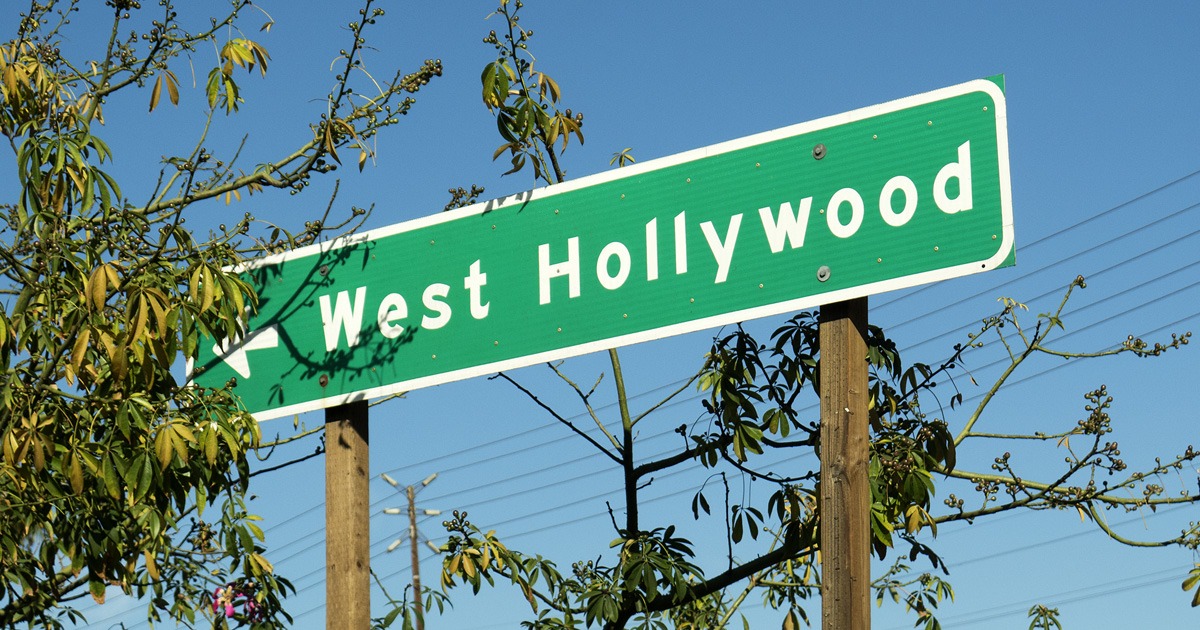 She is a champion of LGBTQ+ rights. As Mayor, she created a Resource Guide to support LGBTQ youth, which was made available in the City Halls of all 88 cities in LA County. Councilmember Horvath’s transition guidelines policy was adopted by the California Attorney General’s office under Kamala Harris. She served as a Board member of the Victory Fund Campaign Board and was a founding Board member of the NOH8 Campaign. Lindsey focused on issues facing LGBTQ older adults while serving on the Board of Services & Advocacy for GLBT Elders (SAGE). She served as Communications VP for Stonewall Democratic Club, which presented her with the 2019 Morris Kight Presidential Award in recognition of her outstanding leadership and steadfast support of the LGBTQ community and the organization. In 2009, she represented the City of West Hollywood in the National Equality March in Washington DC.
She is a champion of LGBTQ+ rights. As Mayor, she created a Resource Guide to support LGBTQ youth, which was made available in the City Halls of all 88 cities in LA County. Councilmember Horvath’s transition guidelines policy was adopted by the California Attorney General’s office under Kamala Harris. She served as a Board member of the Victory Fund Campaign Board and was a founding Board member of the NOH8 Campaign. Lindsey focused on issues facing LGBTQ older adults while serving on the Board of Services & Advocacy for GLBT Elders (SAGE). She served as Communications VP for Stonewall Democratic Club, which presented her with the 2019 Morris Kight Presidential Award in recognition of her outstanding leadership and steadfast support of the LGBTQ community and the organization. In 2009, she represented the City of West Hollywood in the National Equality March in Washington DC.
Lindsey believes that government must earn public trust and work for everyone. That is why she created the City’s Ethics Task Force to review policies for elected & appointed officials, staff, and those who do business with the City. Additionally, she led the effort to eliminate the wasteful, corrupt council deputy system.
Councilmember Horvath also represents West Hollywood’s interests in a variety of roles, as voted on by her colleagues: Executive Board Member for the LA County Division of the League of California Cities; Chair of the Transportation, Communication, and Public Works Committee for California League of Cities; Human Development Committee Vice Chair for National League of Cities; First Vice President of Women in Municipal Government (WIMG) for National League of Cities; Executive Committee Member and Legislative & Regulatory Chair for Clean Power Alliance of Southern California; Board Alternate for the Contract Cities Liability Trust Fund Claims Board & Oversight Committee; Board Member of Los Angeles County Sanitation District. She also serves on the Council’s sub-committees for Metro and Plummer Park. She previously represented the City of West Hollywood on the Los Angeles County Library Commission and on the Executive Board of California Contract Cities Association.
In addition to her service as an elected official and community advocate, Councilmember Horvath has created award-winning campaigns for movies and television as a creative advertising executive. She graduated Cum Laude with a B.A. in Political Science and Gender Studies from the University of Notre Dame. LindseyHorvath4WeHo.com
About The Blunt Post
Founded by Vic Gerami, The Blunt Post is independent and progressive news journalism, opinion, and commentary web magazine that covers the latest news, current events, politics, social justice, entertainment, travel, and lifestyle.
The Blunt Post is also a prime-time radio show called, THE BLUNT POST with VIC (TBPV), hosted by the editor and publisher Vic Gerami on Independent & Progressive Radio KPFK 90.7 FM. TBPV covers national breaking + headline news, offers commentary + analysis, and exclusive interviews. On each show, Vic interviews a member of Congress and other high-profile public figures.
TBPV airs on Mondays, 6:00 AM (PT) on KPFK 90.7 FM + Livestream at KPFK.org and reaches 18-million households in Southern CA. Immediately after the LIVE broadcast, it is available at KPFK.org and on iTunes, Stitcher, Tune-In, SoundCloud, and Spotify. TheBluntPost.com






